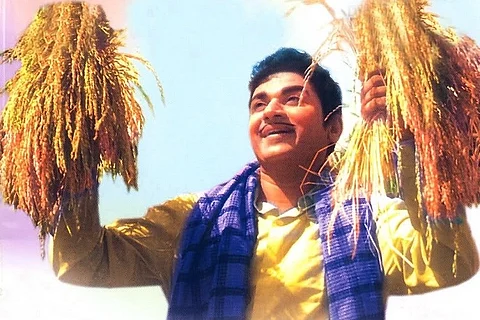

If one digs into the vast ocean that is Kannada cinema, s/he would encounter a number of classics, irrespective of genres. But if there is one film that everybody would vouch for as a classic, without any hesitation, it has to be Bangarada Manushya (Man with a heart of gold or Golden Man).
Bangarada Manushya went on to become the longest-running Kannada film and the most successful movie of all time. It was not only a milestone in the career of Kannada matinee idol Dr Rajkumar, but was also listed as his best performance by Forbes. The impact of the film on the audience was so much that hundreds of people quit their jobs and went back to their villages to take up farming, like the protagonist of the film.
This film ran for as an exceptional 104 weeks continuously in theatres in Bengaluru, 60 weeks in Mysuru and 25 weeks in Mangaluru.
The plot revolves around Rajiv (Dr. Rajkumar), a young man educated in the city, who goes on a visit to a village near Chikkamagaluru to meet his sister. Upon arrival, Rajiv finds that his sister has been widowed.
The dutiful Rajiv takes the onus on himself to take care of his sister, while his elder brother deserts the family, fearing the additional responsibilities. As the sole breadwinner of the family and with the sister’s children dependent on him, Rajiv takes to farming and succeeds at it.
The movie’s focal point is on the importance of farming and how one should respect the land. When Rajiv starts farming, he takes a handful of soil, heartily prays for good crops and only then goes on to learn about the nuances of agriculture. In the climax scene, before leaving the village, he goes to the farm, takes a handful of soil and again prays to ‘Mother Earth’ to take care of his family in his absence.
These two scenes impress upon the audience the connection a farmer has towards the soil - the most important element in agriculture.
In the second half of the film, Rajiv is seen bringing out ‘gold’ from the barren land. Rajiv brings in engineers to help him convert the barren land into a fertile one. The song Aagadu Endu, showcases the technology that can be implemented in cultivation. Not just that, it was also the first time people actually saw the great engineer from Karnataka, Sir M Vishweswaraiah, for the first time on the big screen. The song still stands tall for its inspiring lyrics.
The makers took this opportunity to enlighten people about the technology they had back then. Be it the ones used to blast hard rocks or using earthmovers to create a flat surface, water pumping and more. The song even goes on to tell people about the KRS dam and how it was built and how, even after decades, it is helping millions of farmers in the Cauvery belt. The song and scenes had so much impact that thousands were inspired to take up farming and not just that, but also to use technology in farming.
In one of the scenes in which he goes to meet the heroine (Bharati), he explains to her about co-operative farming in a very simple language - in turn explaining it to the audience. It was only in the '70s that co-operative farming was booming in Karnataka and the film succeeded in explaining the concept in the simplest way.
In a scene in which he helps the father-son duo Balakrishna and Dwarkish break the ice, the makers have intelligently put in a conversation that sheds light on not selling one’s life to western ideology. Dwarkish and Balakrishna’s role is a metaphor of modern and traditional way of living, with a message that western or the modern ideology may not the farmer’s cup of tea.
The film also touched on very important topics like rural development, modern agricultural practices, co-operative movement, social unity, honesty, love, dedication and most importantly, selflessness.
Every song and scene in the film is beautifully crafted to show the lives of farmers. Though Rajiv makes an entry wearing pants and shirt, after he takes up farming, he is mostly seen wearing a Panche (Dhoti), shirt and a towel – which even today is used to represent farmers in films.
Two songs – Aagadu Endu and Hani Hani Goodidre Halla - send a strong message about how and why the farmer is the backbone of the country. In fact, Hani Hani Goodidre Halla is all about celebrating Sankranti or the harvest festival. Hani Hani Goodidre Halla, which translates to ‘every drop counts’, talks about every farmer’s contribution to society and nature.
The film’s success ensured that it was remade in Telugu in 1975 as Devudulanti Manishi, starring Krishna in lead role. For Kannadigas, Bangarada Manushya will remain as the epitome of films.